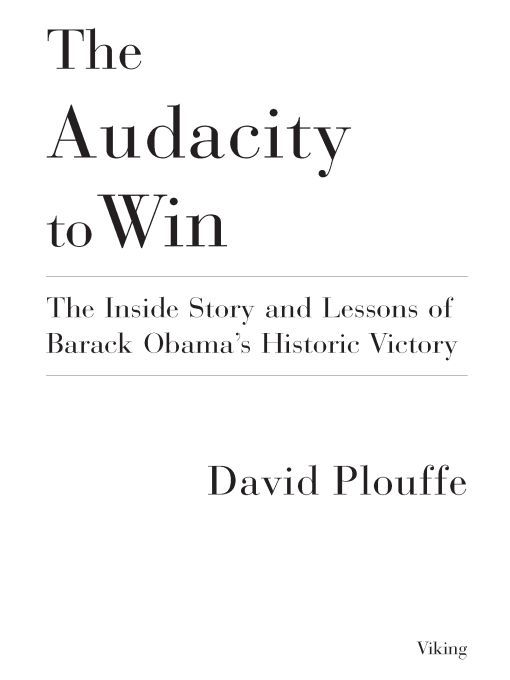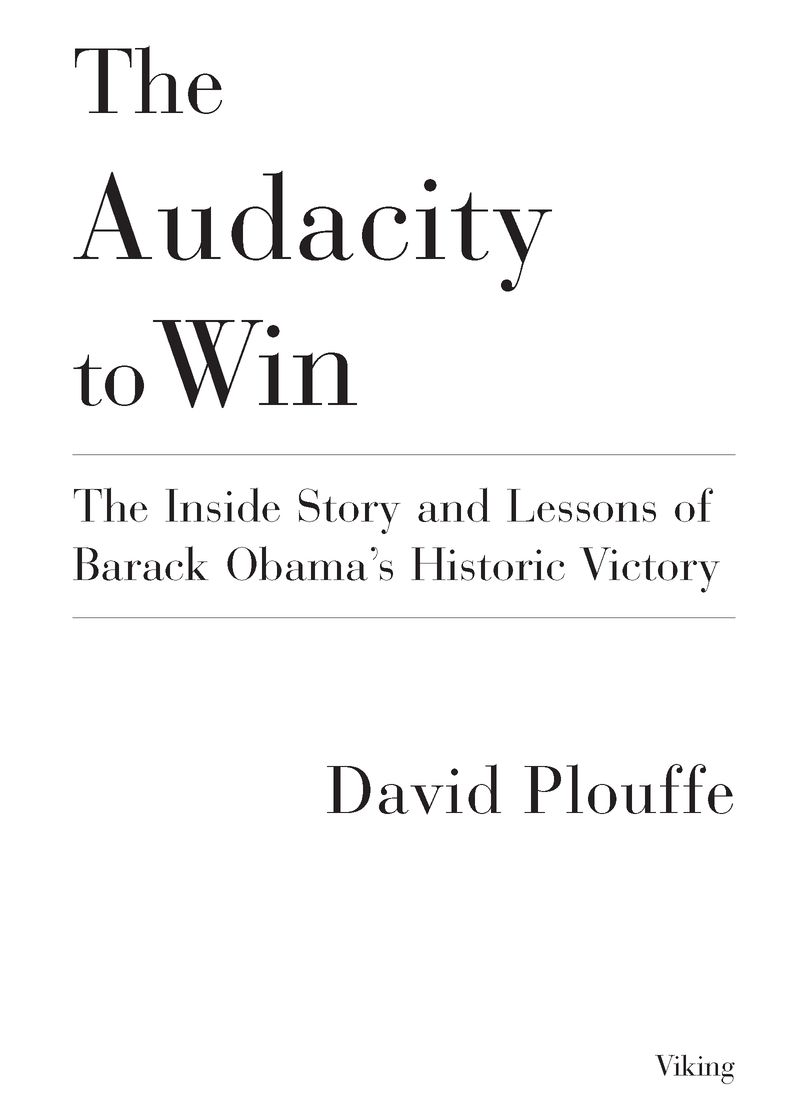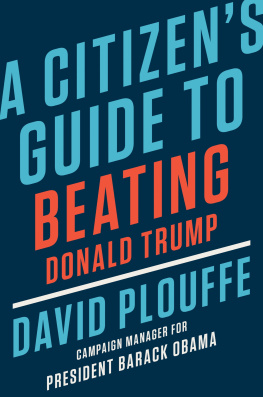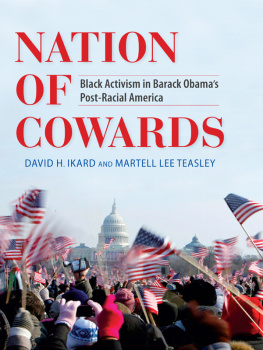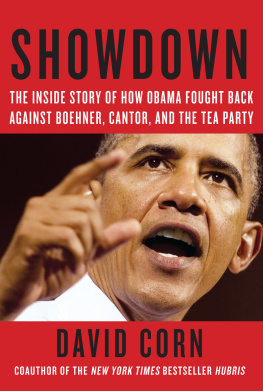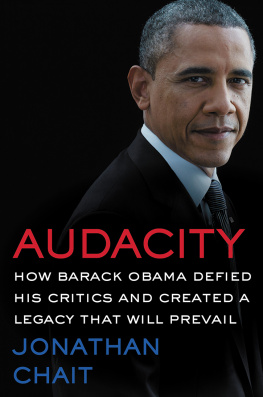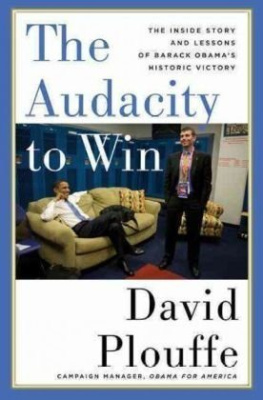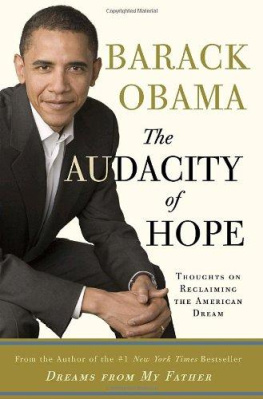Table of Contents
For Olivia, Everett,and Vivian
Prologue
David Axelrod and I left the Obama campaign headquarters election bunker in Chicago at 10:30 p.m. central time to humbling cheers from the knot of staffers who had been prepared for a long night of data crunching and narrow margins. Instead, they were downing beers and celebrating, having just watched all the networks announce the election of their boss as the forty-fourth president of the United States of America.
It was the end of long road. Axelrod and I had begun the journey walking together through an airport in November 2006, en route to our first meeting about the far-fetched prospect of Barack Obamas running for president. At the time we figured it was probably the only meeting that such an unlikely endeavor would yield.
Yet here we were, walking down the hallway of the high-rise that had housed our campaign for almost two years, on our way to greet the president-elect. As we departed the elevator and stepped into the lobby, the security guards broke into raucous cheers and tearful thank-yous. Their joy hit me with a jolt of reality that blaring televisions and hours of encouraging results from battleground states had somehow failed to convey.
Im having a hard time actually believing this, I said to Axelrod as we made our way into the street.
I know, nodded Ax. Its too big to comprehend right now.
We had just elected the president of the United StatesanAfrican American man, born to a Kenyan father and a Kansan mother, just four years out of the Illinois state senate. He had defeated the gold standard in both parties, Hillary Clinton and John McCain, to win in one of the biggest upsets in American political history.
The elation of these security guards, all African Americans, struck me powerfully. Later I learned that this same celebratory scene was playing out all across the country, in groups large and small; black, white, and brown; suburban, urban, and rural. Americans were expressing not merely satisfaction at the victory of a political party or candidate, or relief that the lesser of two evils had prevailed, but something deeper and more profound. Their reactions were closer to a kind of primal joy at seeing wrongs righted, at having risen up to achieve something cynics said couldnt be done. For most of us under a certain age, any prior familiarity with this feeling came secondhand, from history books. Now we owned it.
Ax and I crossed the street to the Hyatt Regency where the next president, his family, and Joe and Jill Biden were watching election results. The advance team directed us up some back stairs, to a blocked-off elevator and eventually down a hall to the Obama suite. Members of the road showthe staff that had spent two years with Obama on the road, living every minute of this amazing and improbable journeylined the hall. Reggie Love and Marvin Nicholson, both giants, swallowed me in their emotional embrace.
As Ax and I slipped into the suite, Obama was on the phone with President Bush, receiving his congratulations. I shivered, as another jolt of reality shot up my spine. Right before we walked in, Obama had received the historic concession call from Senator John McCain, our vanquished opponent. The next minutes were a blur of hugs and happiness: embracing the Bidens; Michelles brother, Craig Robinson; and then a wonderful high-five with Michelle. Michelles mother was radiant, holding hands with her son-in-law, the next president of the United of the States. Then Obama was done talking to Bush and crossed the room toward me. He and I embraced for a long time. He pulled Ax and Robert Gibbs in for a beaming photograph, a treasured memento.
I suddenly noticed how quiet the room seemed. There were no shrieks or champagne corks popping or screams of delight. Perhaps because of exhaustion, relief, or a sense of elation that was more quiet and private than boisterous, we were a remarkably subdued bunch for a party of victors. An outside observer might not have immediately known if we had won or lost the election.
I could not relax. Though victory was sealed, there were still states to be called, and these states were like my babiesI couldnt rest until they were all put to bed, hopefully tucked under a blanket of Obama blue. I stared intently at the suites TVs and checked results religiously on my BlackBerry.
The press coverage and reports from our advance staff told us the crowd at nearby Grant Park was enormous and crackling with energy. We piled into a waiting motorcade and screamed down Lakeshore Drive; before it seemed possible, we began to see the crowd. The throngs on the outer edge of the park saw the motorcade approaching, and a roar of cheering supporters followed us all the way down the drive until we reached the security entrance. Axelrod, Gibbs, and I did not want to watch Obama speak from backstage, so we asked the advance staff to get us out with the crowd. We wanted to be swept up in the human wave of energy.
As I watched Barack Obama emerge onto the stage with his beautiful family, I found it difficult to contain my emotions. Was this really possible? Was this our next first family? Obama delivered a phenomenal speech; at one point he thanked me and Ax personally, which was as surreal as it was embarrassing.
Then it was over. The Obamas and the Bidens embraced and joined hands, waved to the crowd, and strode off the stage.
Two years earlier, this historic moment would have seemed little more than a fantasy. It strained credibilityrequired a certain audaciousness, you might sayto believe that Barack Obama could wrest the Democratic nomination from the Clinton franchise, much less go on to win the presidency with 365 electoral votes, 7 million more popular votes than anyone who had ever run for president, and a higher vote percentage than any Democratic candidate besides FDR in 1936 and LBJ in 1964.
The remarkable Obama for President campaign, led by a once-in-a-generation candidate, had the audacity to winand not just to win, but to do so with guts, defying conventional wisdom time and again. We talked to voters like adults and organized a grassroots movement of average citizens the likes of which American politics had never seen.
It was not easy. At the beginning it was a stretch just to find office space and fill it with computers and phone lines. Taking the first halting steps of the Obama for President journey, most of us, me included, were more resolute than starry-eyed. We could hardly have realized, in signing up to work for this political long shot from Chicago, that we had gained a unique perch from which to watch American history unfold.
Yes or No
The week before the 2006 congressional elections, my business partner, David Axelrod, and I were sitting in an editing suite in Chicago, putting the final touches on a series of television ads for various Democratic clients. We were seven or eight hours into a sixteen-hour session at the studio.
I cant wait for this goddamned election to be over, I grumbled. I want it to be over more than I want to win.
It was a biannual complaint. By October of each election year, everyone in the business has pulled too many all-nighters, been on too many conference calls, and read too many polls. If the whole profession could put the campaign in suspended animation and sleep for a week, it would.

